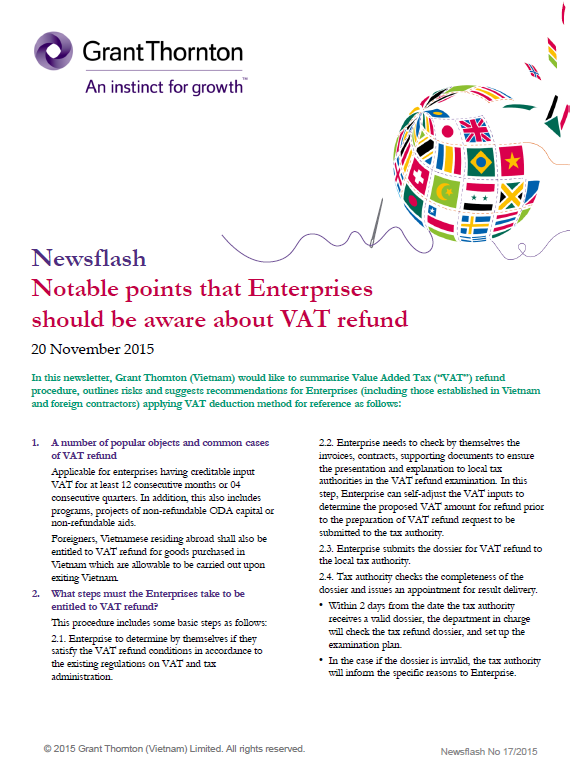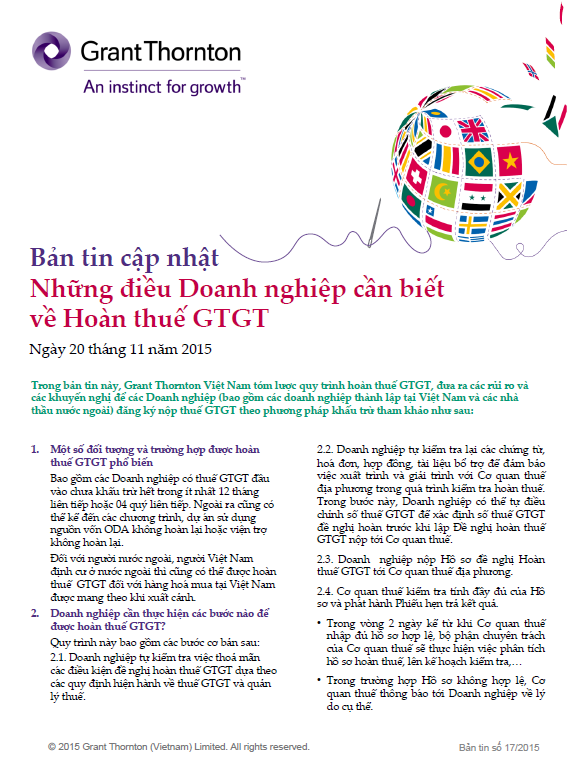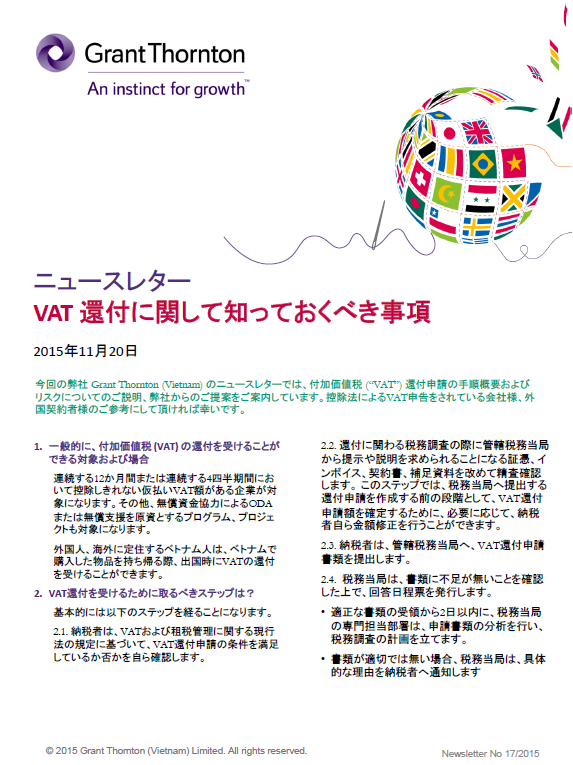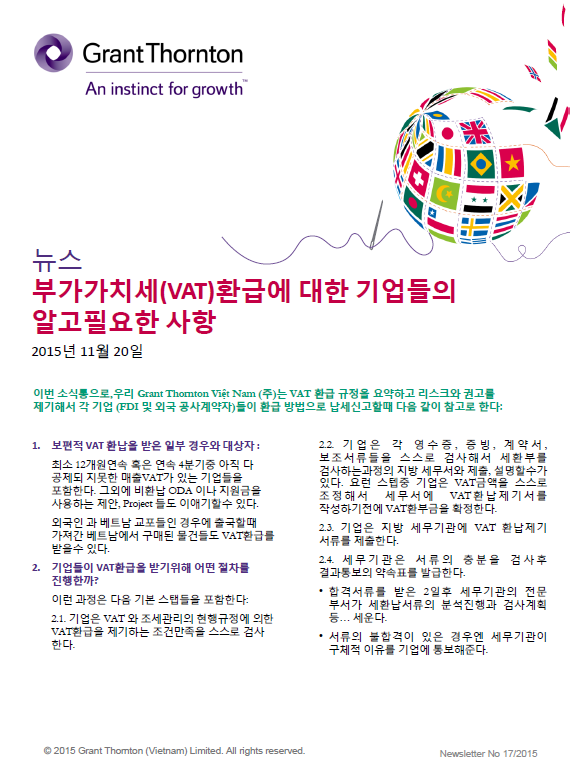Regularly applying for Value Added Tax (“VAT”) refund is a best practice in managing your cash flow and tax risk.
In this newsletter, Grant Thornton (Vietnam) would like to summarise Value Added Tax (“VAT”) refund procedure, outlines risks and suggests recommendations for Enterprises (including those established in Vietnam and foreign contractors) applying VAT deduction method for reference as follows:
1. A number of popular objects and common cases of VAT refund
Applicable for enterprises having creditable input VAT for at least 12 consecutive months or 04 consecutive quarters. In addition, this also includes programs, projects of non-refundable ODA capital or non-refundable aids. Foreigners, Vietnamese residing abroad shall also be entitled to VAT refund for goods purchased in Vietnam which are allowable to be carried out upon exiting Vietnam.
2. What steps must the Enterprises take to be entitled to VAT refund?
This procedure includes some basic steps as follows:
- Enterprise to determine by themselves if they satisfy the VAT refund conditions in accordance to the existing regulations on VAT and tax administration.
- Enterprise needs to check by themselves the invoices, contracts, supporting documents to ensure the presentation and explanation to local tax authorities in the VAT refund examination. In this step, Enterprise can self-adjust the VAT inputs to determine the proposed VAT amount for refund prior to the preparation of VAT refund request to be submitted to the tax authority.
- Enterprise submits the dossier for VAT refund to the local tax authority.
- Tax authority checks the completeness of the dossier and issues an appointment for result delivery.
- The tax authority issues examination decision and carries out the tax examination at Enterprise ‘s head office (for cases that require the examination prior to the refund) or makes the refund to the Enterprise (for cases that are entitle to the refund prior to the examination).
- When the tax authority conducts the examination at the Enterprise’s head office, the Enterprise is required to present the original documents and explain their business activities to substantial for the requested VAT refund amount.
- Concluding the tax examination at the Enterprise’s Head office, both parties upon agreement on the figures, shall sign on the minutes of tax examination, in which specifically stating the compliance with the accounting requirements, VAT, the decreasing adjustments (if any) and the amount of VAT to be refunded as per the Enterprise ’s request, or requests the Enterprise to pay the additional VAT liability due to the identified output VAT is greater than requested VAT refund amount.
- Enterprise receives the refund amount.
- Depending on each refund dossier and specific period, Enterprises could be required to be audited again by a higher-level of tax authority or by the request of the State Auditor (through the coordination with the local tax authority) for the dossier which have already been refunded.
3. What are the Enterprise’s rights and obligations when lodging for VAT refund?
- Rights to receive interest when being delayed for the refund
- Rights to appeal
- Obligation to keep and provide dossier to Tax authority
4. Some risks that Enterprises should be aware prior to the submission of the tax refund dossier
- Enterprise has to implement the tax declaration in accordance to the tax administrative procedures as prescribed by legal documents on tax administration.
- Enterprise may not be able to provide invoices/ contracts/ original documents as required by the tax authority or illegal documents due to the presentation in foreign languages.
- When the tax authority requests explanations, different departments of the Enterprises provide information inconsistently to the Tax authority or the provided information was not supported with documents.
- The Tax authority may request the Enterprise to adjust the tax obligations detected during the inspection or transfer to the relevant departments of the tax authority or the Police, for example: under declaration or inaccurately declaration of the PIT liabilities of the expatriates, foreign contractor tax liabilities on payments to foreign parties, or lack of supporting dossiers on the transferred price which could be suspected to be manipulating the transfer price, etc.
- The Tax authority can impose penalties for violation of administrative procedures, and 10% to 20% on the required refund amount not in compliance with the regulations, and late interest of 0.05% per day (approximately 18%/year).
5. What Grant Thornton (Vietnam) can support when Enterprises need to claim for VAT refund?
- Support Enterprises to determine the conditions for VAT refund and review the contents of the draft VAT refund dossier prior to the submission to local Tax authority.
- Support Enterprises to implement the review of documents, invoices, contracts and supporting documents to ensure that potential risks have been detected and the measures of risk management are implemented properly in compliance with the regulations and laws.
- Support Enterprises to present to the Tax authorities in respect to the Enterprise ’s tax obligations during tax examination conducted at the Enterprise ‘s head office.
- Support Enterprises to build and implement procedures to control the VAT risks, invoices and business processes for ease of management of tax risks, simplify the process for other upcoming VAT refund.
Please contact with Grant Thornton Vietnam professional tax advisors if Enterprises need further assistance.




